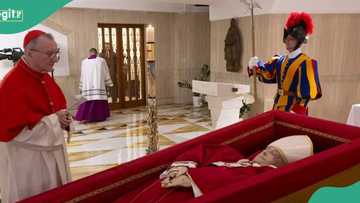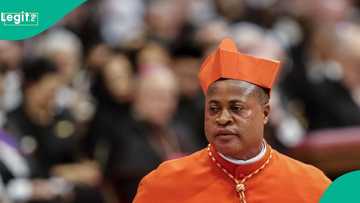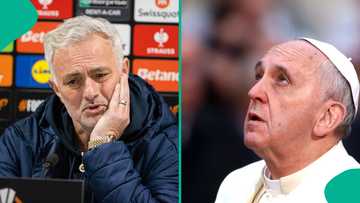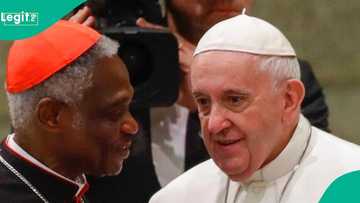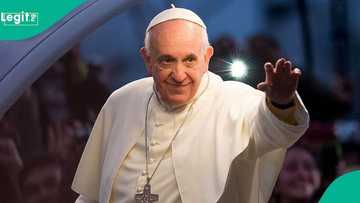How Pope Francis Confronted Tribalism in Nigeria’s Catholic Church, By Johnstone Kpilaakaa
Editor's note: In this piece, Johnstone Kpilaakaa, Catholic Church commentator, writes in the wake of Pope Francis’s passing, recalling the Pope’s firm yet pastoral response to tribal divisions in Nigeria’s Catholic Church—an episode that revealed his deep commitment to unity and spiritual leadership.
When some Nigerian Catholics in the Southeast rejected a bishop over tribal ties, Pope Francis stepped in with a bold act of spiritual authority. This is the story of his quiet intervention—and the cardinal it helped shape.
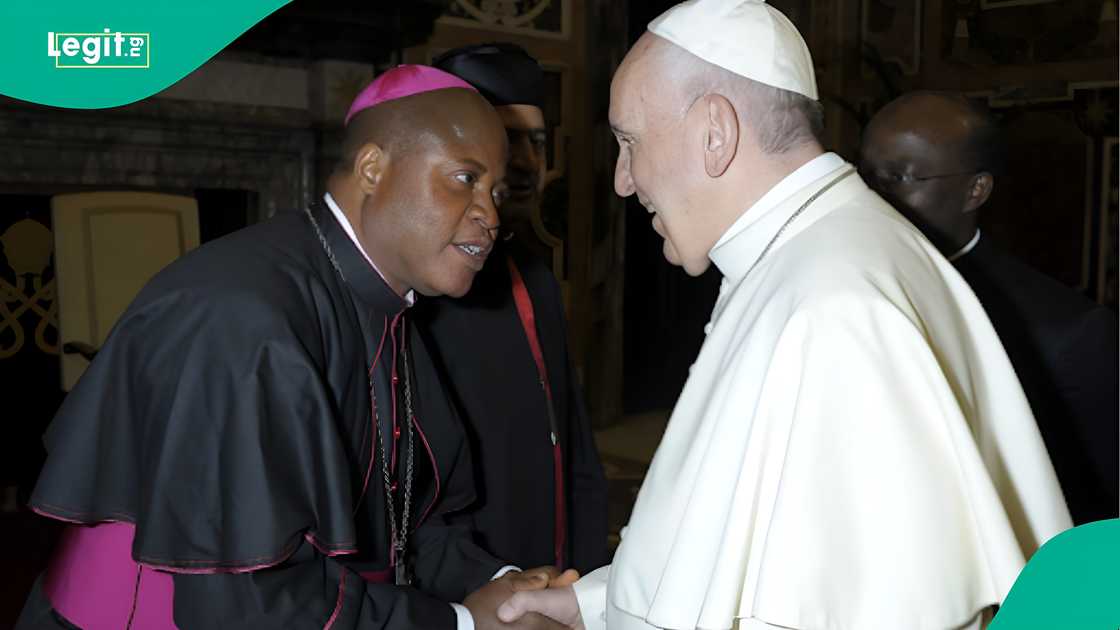
Source: UGC
I was in the middle of a radio interview when the notification popped up on my screen: Pope Francis was dead. The Vatican News, the Holy See’s state publication, had published the announcement just two minutes earlier.
Only hours before, I had shared a video on my WhatsApp status showing him being rolled onto the loggia at Saint Peter’s Basilica for the customary Urbi et Orbi benediction. It turned out to be his final public appearance.
I like to think he had a premonition. In the days leading up to his passing, he made several surprise appearances during Holy Week, defying his medical team’s advice. He even visited the Basilica, where he had requested to be buried.
In his Easter message, read out from the loggia that Sunday, he called for peace, particularly in Africa. The message struck me deeply. I had just returned from covering a massacre in central Nigeria. His words couldn’t have been more timely.
Later that night, I found myself working on an application for the Human Fraternity Fellowship, an initiative inspired by Fratelli Tutti, Pope Francis’s encyclical on fraternity and social friendship. His papacy was marked by a commitment to love, unity, and the mending of broken bridges—a legacy that resonates far beyond the Vatican.
Among the many crises he navigated during his time as pontiff, one particularly stands out in Nigeria: the Ahiara Diocese debacle.
A Bishop Rejected
In 2012, Pope Benedict XVI appointed Bishop Peter Ebere Okpaleke to lead the Ahiara Diocese in Imo state, southeastern Nigeria. However, Okpaleke, though Igbo like the local faithful, was not from the Mbaise community, the predominant ethnic group in Ahiara. His appointment sparked protests from both clergy and parishioners, who argued that a qualified local priest should have been chosen.
A petition by the Coalition of Igbo Catholics stated:
“Not on the qualifications of Rev. Fr. Okpaleke but on the disqualification of a vast pool of qualified priests of Mbaise origin.”
It’s worth noting that canon law does not require a bishop to be indigenous to the diocese he leads. In fact, some prominent bishops in Nigeria, such as Archbishop Matthew Ishaya Audu of Jos and Archbishop Ignatius Kaigama of Abuja, are not from the dioceses they head.
Despite being ordained in 2013, Okpaleke remained unable to assume his post in Ahiara. That same year, Pope Benedict XVI resigned, and Pope Francis assumed the papacy. As he settled into his new role, this simmering crisis in faraway Nigeria came onto his radar.
Pope Francis takes charge
Pope Francis appointed Cardinal John Onaiyekan, then Archbishop of Abuja, as Apostolic Administrator of the troubled diocese. This was not merely a bureaucratic gesture—it was a sign that the Vatican was listening.
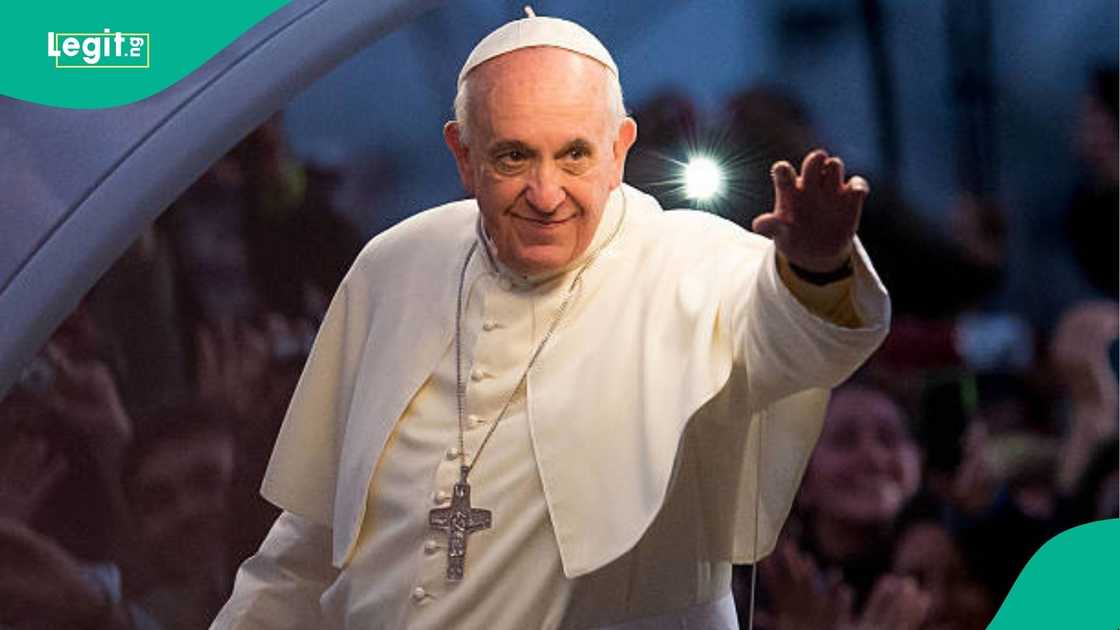
Source: Getty Images
Four years later, a delegation from Ahiara visited the Pope in Rome. His response was firm but pastoral.
“Whoever is opposed to Bishop Okpaleke wants to destroy the Church,” he said.
“I even considered suppressing the Diocese, but the Church is a mother. She cannot abandon her children.”
He then issued a historic ultimatum: every priest incardinated in the Diocese of Ahiara—whether based locally or abroad—must write a letter to him personally within 30 days, asking for forgiveness and pledging obedience. Failure to do so would result in suspension a divinis, effectively barring them from performing priestly functions.
By July 8, 2017, many letters had been sent. But the local resistance persisted. On 22 July, Pope Francis opted to send emissaries to engage directly with the dissenting clergy.
A painful, peaceful resolution
Eventually, Bishop Okpaleke resigned from his appointment—a decision believed to have been encouraged by the Vatican. In his resignation letter submitted on 14 February 2018, he wrote:
“I do not think that my apostolate in a diocese where a group of priests and lay faithful are very ill-disposed to have me in their midst would be effective.”
Pope Francis accepted his resignation five days later. But the story didn’t end there.
In a redemptive turn, Okpaleke was appointed bishop of the newly created Diocese of Ekwulobia on 5 March 2020. He was installed on 29 April that year, and in 2022, Pope Francis elevated him to Cardinal. Today, he is not only a cardinal but the only Nigerian eligible to vote in the conclave that will elect Francis’s successor—a fitting fulfilment of the words, “The stone the builders rejected has become the cornerstone” (Psalm 118:22).
Legacy of a bridge-builder
Pope Francis may be remembered globally for his humility, environmental advocacy, and emphasis on social justice. But in Nigeria, his quiet intervention in a bitter, ethnically charged church crisis stands as a testament to his commitment to reconciliation.
In Ahiara, he demonstrated the delicate balancing act of papal authority—firm in doctrine, yet pastoral in approach. His message was clear: the Church is bigger than tribal loyalties.
Disclaimer: The views and opinions expressed here are those of the author and do not necessarily reflect the official policy or position of Legit.ng.
Johnstone Kpilaakaa is a Nigerian journalist and Catholic Church commentator. He writes from the Archdiocese of Jos.
Source: Legit.ng


